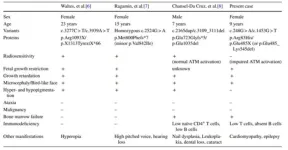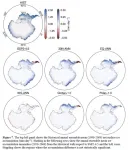(Press-News.org) Researchers from the University of B.C. and the BC Provincial Toxicology Centre (BCPTC) have developed a more efficient way to find out which new ‘designer drugs’ are circulating in the community.
In a study published today in Analytical Chemistry, they showed how high-resolution mass spectrometry can be used to analyze urine samples at scale and uncover molecules from emerging designer drugs that have been missed by conventional testing.
The approach can support public health and safety by enabling swift identification of new substances, potentially saving lives and guiding timely clinical responses to drug-related emergencies.
"We were able to detect a number of drugs circulating in B.C. that were not being detected by existing tests. Any time such drugs emerge locally, that’s important information for clinicians and public health officials to have,” said Dr. Michael Skinnider, the study’s lead author who conducted the research as an MD/PhD student at UBC and is now an assistant professor at Princeton University.
Designer drugs have proliferated in the past two decades in the unregulated market. They tend to be modified versions of other drugs, with similar effects but just enough structural changes to get around drug laws. The drugs do not undergo proper testing or regulation. Some can poison or even kill users.
The BCPTC at the BC Centre for Disease Control (BCCDC) has identified over 20 different drugs of concern while monitoring for them since 2020.
To confirm whether a drug is present in a sample, a lab must first know what they’re looking for and obtain that drug in synthetic form. This becomes their “reference standard,” and it’s used to develop a repeatable laboratory test that leaves no doubt about the substance’s presence.
However, reference standards can be hard to acquire. Sometimes the drugs are so new that a reference standard simply doesn't exist. Sourcing hundreds of reference standards for drugs that may or may not show up in the community is expensive and impractical, so laboratories instead make educated guesses about which ones to acquire.
The goal of the UBC/BCPTC study was to find a better way to prioritize acquisition of reference standards.
To do this, the researchers used high-resolution mass spectrometry to re-analyze more than 12,000 urine samples collected in B.C. from 2019 to 2022. If you imagine a urine sample to be a jigsaw puzzle with all its pieces scattered in the form of molecules, mass spectrometry can precisely determine the weight and shape of each puzzle piece, which helps researchers figure out which ones fit together in combinations that are typical of illicit drugs.
If a laboratory anywhere in the world has published data about new drug molecules found in their samples, a lab in B.C. can compare its data with theirs and determine which drugs are most likely showing up locally.
It’s not a definitive confirmation, but it’s enough to point the lab toward the right reference standards for more thorough testing.
The retrospective analysis of B.C. samples at BCPTC surfaced new synthetic opioids, benzodiazepines and stimulants that had eluded identification during initial screening. One of them, fluorofentanyl, is a modified version of fentanyl that was absent from samples before mid-2022 and then spiked during the final few months of the study. This suggests it was introduced to the local drug supply quite suddenly.
A few of the other drugs also had distinct peaks during the two-year study period.
“Applying this process on a regular basis will allow us to respond much more quickly to the emergence of new drugs and greatly reduce the time between a drug's introduction to the community, and our ability to test for it in a rigorous way," said Dr. Aaron Shapiro, the study’s senior author who is a clinical assistant professor in UBC’s department of pathology and laboratory medicine, and associate scientific director of the PTC.
The BCCDC is in the process of implementing this new tool into its clinical urine drug screen and hopes to apply it to other datasets in the future.
Researchers from the chief medical examiner's office in San Francisco and St. Paul’s Hospital in Vancouver also contributed to the study.
END
New process for screening old urine samples reveals previously undetected ‘designer drugs’
2023-11-15
ELSE PRESS RELEASES FROM THIS DATE:
This 3D printer can watch itself fabricate objects
2023-11-15
With 3D inkjet printing systems, engineers can fabricate hybrid structures that have soft and rigid components, like robotic grippers that are strong enough to grasp heavy objects but soft enough to interact safely with humans.
These multimaterial 3D printing systems utilize thousands of nozzles to deposit tiny droplets of resin, which are smoothed with a scraper or roller and cured with UV light. But the smoothing process could squish or smear resins that cure slowly, limiting the types of materials that can be used.
Researchers from MIT, the MIT spinout Inkbit, and ETH Zurich have developed a new 3D inkjet printing system that works ...
A new kind of magnetism
2023-11-15
For a magnet to stick to a fridge door, inside of it several physical effects need to work together perfectly. The magnetic moments of its electrons all point in the same direction, even if no external magnetic field forces them to do so. This happens because of the so-called exchange interaction, a combination of electrostatic repulsion between electrons and quantum mechanical effects of the electron spins, which, in turn, are responsible for the magnetic moments. This is common explanation for the fact that certain materials like ...
Researchers identify the variants responsible for a rare and serious disorder
2023-11-15
A research team, led by Tokyo Medical and Dental University(TMDU), identifies disease-associated variants in a rare case of RAD50 deficiency/Nijmegen breakage syndrome-like disorder
Tokyo, Japan – Many disorders are caused by genetic variants; to make matters worse, the genetic origin of most disorders remains unknown. Now, in a study recently published in the Journal of Clinical Immunology, researchers have shed light on the specific variants responsible for one rare and serious disorder: ‘RAD50 deficiency/Nijmegen breakage syndrome-like ...
Do extracurricular activities always give children a head start? Research says maybe not
2023-11-15
In China, there is an old saying: "Don't let your children lose on the starting line." It highlights parents' desire to jumpstart their child's early development. Especially in recent years, parents have become increasingly anxious about their children's education, making it a trend to encourage children to participate in extracurricular activities from an early age. But is participating in extracurricular classes always advantageous for young children?
Recently, a study published in the Journal of School Psychology found that extracurricular activities don't always improve a child's skills or behaviour.
The ...
$3.37 million NIH grant backs effort to optimize online obesity programs for rural residents
2023-11-15
University of Virginia School of Medicine public health researchers, together with colleagues at the University of South Carolina, have received a $3.37 million grant from the National Institutes of Health to determine if online behavioral weight-management programs for rural residents can be improved by adding a human touch.
Online obesity programs have typically failed to yield the same benefits as in-person programs, the researchers note, so they will test three approaches to add human involvement. More than 600 volunteer participants will be enrolled in a core online 24-week weight-loss ...
The American Pediatric Society names Dr. Rachel Katzenellenbogen as the recipient of the 2024 Norman J. Siegel New Member Outstanding Science Award
2023-11-15
The American Pediatric Society (APS) is pleased to announce Rachel Katzenellenbogen, MD, as the 2024 Norman J. Siegel New Member Outstanding Science Award recipient for her considerable contributions to pediatric science. The award will be presented to Dr. Katzenellenbogen during the APS Presidential Plenary at the Pediatric Academic Societies 2024 Meeting.
The award was created in honor of one of the world’s leading nephrologists, Norman J. Siegel, MD, FASN. Dr. Siegel was an outstanding teacher and mentor, nurturing the early careers of numerous fellows and residents. He was a leader within the medical community and educated the ...
Climate engineering could slow Antarctic ice loss, study shows
2023-11-15
Scattering sunlight-reflecting particles in the atmosphere could slow rapid melting in West Antarctica and reduce the risk of catastrophic sea-level rise, according to a study led by Indiana University researchers.
The study, one of the first to look at how climate engineering might impact Antarctica, comes as scientists sound the alarm over the increasing likelihood of accelerated ice loss in West Antarctica this century. The work appears in the Journal of Geophysical Research: Atmospheres.
“Even if the world meets the ambitious target of limiting global warming to 1.5 degrees Celsius above pre-industrial levels — which we are not on track ...
New report outlines microbial solutions to mediate methane emissions
2023-11-15
Washington, D.C.—The American Academy of Microbiology, the scientific think tank and honorific leadership group at the American Society for Microbiology (ASM), has released a new report, The Role of Microbes in Mediating Methane Emissions. The report highlights recommendations to further the scientific community’s understanding of microbial processes of methane production and consumption to mitigate methane emissions and address climate change.
Microbes can influence climate change through biogeochemical cycles that ...
NYU Tandon takes a quantum leap with new minor
2023-11-15
NYU Tandon School of Engineering is poised to become one of an extremely select group of American universities offering an undergraduate program in quantum technology, situating it at the forefront of a fast-growing field in which high employer demand significantly outpaces available talent.
Beginning in the spring 2024 semester, NYU Tandon students can start earning credits towards the new quantum tech minor, offered through the Department of Applied Physics.
In the past decade, quantum technology – the use of ...
Stand Up To Cancer announces three teams focused on gastroesophageal cancer
2023-11-15
LOS ANGELES – Nov. 15, 2023 – Stand Up To Cancer® (SU2C) today announced three Research Teams focused on bringing new therapies to clinical trials for the treatment of gastroesophageal cancer (GEC). The Research Teams, a part of a Dream Team Collective supported by the Torrey Coast Foundation, will unite top researchers from 11 institutions to address critical problems in GEC prevention, diagnosis and treatment. The Dream Team Collective aims to foster new and inclusive cancer research on the causes and treatments of GEC, mentor a new generation of scientists focused on GEC, bring ...





